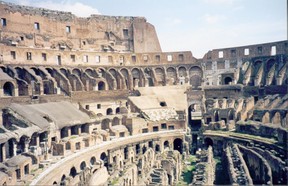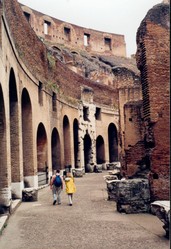
Origins of Italian
by traveller27
Are you planning on learning how to speak Italian? If you are, you may be interested in learning more about the origins of modern standard Italian.
How is Italian Classified?
The Romance Family of Languages
 Italian is one of the major Romance Languages, otherwise known as the Italic languages. Spanish, French, Portuguese, and Romanian are the other major languages of this branch of the Indo-European family of languages, while Catalan, Rhaeto-Romanic, Sardinian, and Provençal (spoken in southeastern France) are regarded as minor Romance languages. All of the modern Romance languages are descendants of Latin. Latin finds its roots in the Indo-European family of languages.
Italian is one of the major Romance Languages, otherwise known as the Italic languages. Spanish, French, Portuguese, and Romanian are the other major languages of this branch of the Indo-European family of languages, while Catalan, Rhaeto-Romanic, Sardinian, and Provençal (spoken in southeastern France) are regarded as minor Romance languages. All of the modern Romance languages are descendants of Latin. Latin finds its roots in the Indo-European family of languages.
The Indo-European Languages
The Indo-European family of languages is the world's largest language family. Relatively speaking, it isn't a large family in terms of total number of languages but it is the largest family if we consider the number of people who are speakers of an Indo-European language. Within its branches we find both of the classical languages - Greek and Latin. The Indo-European languages are divided into nine branches. 1) Romance (Italic), 2) Germanic, 3) Celtic, 4) Hellenic (Greek), 5) Albanian, 6) Armenian, 7) Baltic, 8) Slavic, and 9) Indo-Iranian. Nearly all of Europe's languages are Indo-European, as are the languages of the Americas and most of Asia. The only European languages not classified as Indo-European are Basque, Finnish, Estonian, Hungarian and Turkish.
The Italic Languages
Latin belongs to the Italic branch of the Indo-European family of languages. The Italic languages were originally comprised of languages spoken in the Appenine Peninsula (modern-day Italy) and the eastern portion of the Po Valley. The original members of the Italic branch of the Indo-European family were Latin, Falisian, Osco-Umbrian, and the Venetic languages.
Latin originated from a Roman dialect, one of the numerous Latinian dialects. It was the language of ancient Rome, beginning as a local dialect of a village along the Tiber River. As Rome gained prominence, the Latin of Rome became the literary standard. This standardized Latin is referred to as Classical Latin and emerged around the 6th century BC. A spoken form of Latin developed and, as a result of the conquests of the Roman army, Latin spread throughout the Roman Empire. During this time, the spoken form of Latin, otherwise known as the vernacular, was already differentiating itself from Classical Latin.
The Modern Romance Languages
 The modern Italic languages are all descended from Latin and are called the Romance languages, deriving their name from the fact that their roots can be traced to the language of Rome and the Roman Empire. As the Roman Empire began to lose its power and was divided, different forms of Latin arose. Each was influenced by surrounding languages, each developed its own distinctive features, and these variants of Latin developed into the modern Romance languages.
The modern Italic languages are all descended from Latin and are called the Romance languages, deriving their name from the fact that their roots can be traced to the language of Rome and the Roman Empire. As the Roman Empire began to lose its power and was divided, different forms of Latin arose. Each was influenced by surrounding languages, each developed its own distinctive features, and these variants of Latin developed into the modern Romance languages.
The Romance languages are sometimes divided into an Eastern group (Italian and Romanian), and a Western group (French, Spanish, Portuguese and Catalan). Sardinian is considered to be on its own within the Romance languages. Of the modern Romance languages, Italian has remained the most similar to Latin.
Italian
La mia lingua preferita (My Favorite Language)
 Italian has a standard form, but it also has numerous dialects, just like any other major language. The standard form of Italian is based on Tuscan, the dialect of Florence, located in the Province of Tuscany. The standard form of Italian eminates from the 14th century when Florence was one of the most prominent cities of the Renaissance. The dialect of Tuscany was used by literary greats such as Dante Alighieri. Modern Italian has evolved from the original Tuscan dialect and has also borrowed words from many Italian dialects. With the advent of high-tech, Italian has also borrowed words from the English language.
Italian has a standard form, but it also has numerous dialects, just like any other major language. The standard form of Italian is based on Tuscan, the dialect of Florence, located in the Province of Tuscany. The standard form of Italian eminates from the 14th century when Florence was one of the most prominent cities of the Renaissance. The dialect of Tuscany was used by literary greats such as Dante Alighieri. Modern Italian has evolved from the original Tuscan dialect and has also borrowed words from many Italian dialects. With the advent of high-tech, Italian has also borrowed words from the English language.
Italian has been the official language of Italy since the nineteenth century and it is also the official language of The Republic of San Marino, the Vatican City State, and it is one of Switzerland's four official languages. It is also spoken in the United States, Canada, France, Argentina and Brazil.
Interested in traveling to Italy - there are lots of great travel destinations to choose from http://www.squidoo.com/italy-travel-lensography
Parliamo italiano! (Let's speak Italian!)
Do you speak Italian?
English-Italian Dictionary
Independent Travel in Europe: Languages
Travel phrases and vocabulary translated from English to Italian, French, Spanish, German and Romanian.
http://www.freedict.com/onldict/ita.html
Free online English to Italian and Italian to English dictionary.
Italian Verbs & Grammar
 | Practice Makes Perfect: Complete Italian Grammar (Practice Makes Perfect Series) Build up your Italian grammar skills and communicate with ease The only way to boost your confidence in a second language is to practice, practice, practice. From the present ... |
 | Italian Grammar Drills (Drills Series) Sharpen your Italian grammar with skill-building exercises If you want to be proficient in Italian, you eventually have to clear the bothersome hurdle of grammar. The best way ... |
 | Practice Makes Perfect: Italian Verb Tenses (Practice Makes Perfect Series) Conjugate verbs like a Italian Most verb books offer little more than conjugation charts and a few mechanical exercises. Practice Makes Perfect: Italian Verb Tenses gives you ... Only $70.9 |
 | Italian Verb Drills, Third Edition (Drills Series) Get the expert instruction you want and the practice you need with the conjugation of Italian verbs--with bonus online interactive exercises Italian Verb Drills helps you ... |
 | 501 Italian Verbs: with CD-ROM (Barrons Foreign Language Guides) (Italian and English Edition) Barron's is today and always has been the Number-One reference source for verb usage in virtually every major language. Leading all competition, the best selling 501 Italian ... |
 | Practice Makes Perfect: Italian Pronouns and Prepositions (Practice Makes Perfect (McGraw-Hill)) Master these two essential building blocks of fluency in Italian quickly and painlessly Practice Makes Perfect: Italian Pronouns and Prepositions provides you with clear, ... |
Italian on DVD
 | INSTANT IMMERSION ITALIAN - Format: [DVD Movie] INSTANT IMMERSION ITALIAN - DVD Movie Only $5.0 |
 | Portable Italian (Learn Italian Anywhere Anytime) Language Learning is a building with four walls: reading, writing, speaking, and listening. Portable Italian teaches you all areas of beginning Italian. Portable Italian ... Only $84.86 |
 | Italian 101 Learn the 101 critical words and phrases in Italian to travel safely and have fun abroad. Whether dining in Rome, traversing the canals in Venice, or wandering around ... Only $71.01 |
 | The Standard Deviants - Parla Italiano (Learning Italian - The Basics) Planning a trip to Rome? Vacationing in Venice? The Standard Deviants can help you learn the basics of Italian. Starting with the alphabet, this tape covers numbers, days of ... |
You might also like
Introduction to ItalianOverview of Italian and a few fundamentals of Italian grammar.
British English Phrases, Idioms, and Expressions (Letters A-C)By Mira at Wizzley. Some of my favorite words and phrases that are particular...







 Classifying Languageson 09/26/2011
Classifying Languageson 09/26/2011
 Introduction to Italianon 08/29/2011
Introduction to Italianon 08/29/2011
 Golf "Fore" Ever - Tribute to Roly Brault, Former Golf Pro & Course Designeron 08/23/2011
Golf "Fore" Ever - Tribute to Roly Brault, Former Golf Pro & Course Designeron 08/23/2011



Your Turn
I have a strong interest in language, although I've never tried Italian. Spanish and French have been my areas of study. This is a very useful resource for potential Italian speakers.
This sounds like a lovely language to learn.
I love the sound of Italian. I have only used it myself in my (amateur) singing. It has such a beautiful roll-off-the-tongue musical sound. Thanks for your information.
Fantastic. Full of interesting facts that are new to me. Well done. I'm impressed. Trust Wizzley to bring out the best in a person. I have a friend who lives near Modena and who is trying to learn Italian. She is married to an Italian. I have sent her the link. TYVM for your page.
Interesting page on a language that I've heard but do not know. You presented this so clearly...I didn't realize languages had classifications, such as romance languages...and that the romance languages all came from Latin. I always regret not learning an additional language when in school or since. I suppose it is never to late.